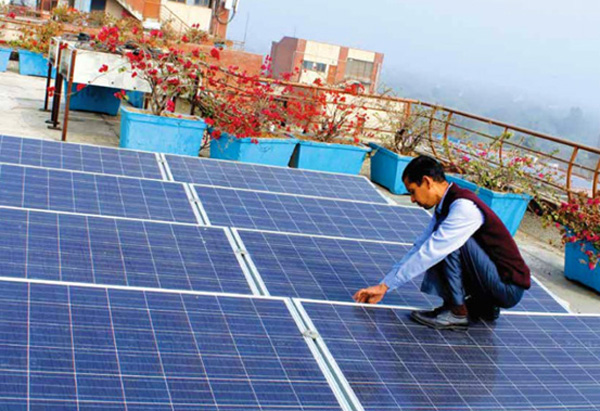Newsletter - February 7, 2018
India's ever ambitious RE targets could be marred by flagging investor confidence
RENEWABLES: ‘Striking rise’ in solar tariff, 5% solar glass tariff dropped, Minister expects 50% renewable energy by 2030
India’s 50% energy to be ‘renewable by 2030’
Coal Minister Piyush Goyal said renewables will cover 50% of India’s energy requirements by 2030, thanks to fast-improving solar and wind technology and India will exceed the 175GW renewable target by 2020 and touch 200GW by 2022.Solar tariffs rise by huge 50 paise
Solar tariffs rose by a ‘striking’ 50 paise to Rs 2.94 per unit in the latest auctions in Karnataka from its previous lows of Rs 2.47 and 2.44 in Rajasthan. Experts blame the rising costs of Chinese equipment, and India’s 7.5% import duty. Developers are doubly worried about the proposed 70% ‘safeguard’ duty on solar imports to protect domestic manufacturing. With projects worth over Rs 15,000 crore at risk of turning into NPAs, rating agencies have sought clarity from the government. The minister has assured safety.Budget 2018: Govt to drop 5% tax on solar glass
The 2018 budget has proposed to end 5% customs duty on tempered glass imported to make solar cells. The Budget also included Rs 1,40,000 crore Kusum scheme to solarise agricultural pumps and encourage use of barren land for setting up solar plants. Farmers will be given 60% subsidy on solar pumps, 30% through bank loans. Farmers to bear 10% upfront cost.Shell buying spree cranks up race for clean energy
The oil and gas giant Shell is on renewable buying spree, spending $400 million to buy solar and electric car charging products. Oil and gas biggies such as BP, Exxon Mobil and Chevron, are also banking on rising demand for gas, to power the expected surge in electric vehicles in the coming decades.Power after sunset: China plans 2 GW high-tech solar plant
China plans to set up the largest 2GW solar plant based on concentrated solar power (CSP) technology in Mongolia. The $7.27 billion plant is China’s push to boost energy storage expertise.Unlike photovoltaic (PV) plants, CSP technology generates solar power by using mirrors. CSP plants store thermal energy in molten salt or synthetic oil, allowing CSP plants to continue generating power after sunset. China plans to set up 5 GW of CSP by 2020.EVs could take center stage at this year's Auto Expo for both automakers & consumers
Budget 2018 ‘ignores’ EVs, Transport minister expects big change by 2020, Mahindra plans 6 EVs
Budget 2018: Electric Vehicles ignored, ‘contradicts government’s vision’ of 100% electric mobility?
2018 budget disappointed the electric vehicles sector as it didn’t offer funds or tax benefits to the sector. The budget ‘ignored’ industry expectations leaving the 12% GST on EVs and 28% on batteries unchanged. Experts say this contradicts government vision for electric mobility by 2030.
EVs powered with 100% renewable energy can save Rs 40,000: Report
According to a new research, electric vehicles if 100% powered by renewable energy can save Rs 40,000 fuel cost annually. The authors have urged state think tank NITI Aayog to ensure that EVs are 100% powered by renewable energy. NITI Aayog’s consultations with public on EV policy ended on January 31.
Mahindra to unveil 6 new electric vehicles at Auto Expo 2018
Mahindra plans to unveil six new EVs at the upcoming 2018 auto expo motor show, including both production and concept models. The XUV Aero could be its flagship EV with top speed of 190kmph, and 300km range on a single charge. Electric Scorpio is also been tested, reports suggest.
Tesla ‘Still Welcome’ in India
Transport minister Nitin Gadkari said India is still ready to offer Tesla land if they want to set up factory in India. Tesla chose China for its first overseas car assembly plant. Earlier, Tesla ‘faced problems’ with India’s local sourcing policy and import duties. Gadkari said new tax structure is being planned for EVs. Situation ‘will change in 2 years’ he added. Meanwhile, Tesla has deniedreports of further delay in production of Model 3, its most-affordable sedan. Experts say a delay could phase out tax credits, which can dampen the sales of economy-class model.
California Gov pushes for 5 million zero-emission cars by 2030
California’s governor has signed executive order to back Zero emission Vehicles (ZEVs) and charging stations to curb pollution from cars and trucks. Governor Brown has called for a new target of 5 million ZEVs in California by 2030. Meanwhile, in a setback to ‘least polluting’, peaking gas plants, California is to replace ‘aging natural gas peakers’ with the world’s largest battery energy storage facility.
Harley-Davidson lures youth with electric bike
Harley-Davidson plans to lure younger buyers by its first E-bikes. The new bike, which has yet to be named, is expected to be available within 18 months.
Not what we paid for: The air in India's cities and towns is becoming more toxic each year
AIR POLLUTION: India falls to rock bottom on air pollution index, ‘govt backing’, or battling polluting industry? Economic Survey shows way to clean air
Environment Performing Index: India falls to 178, China at 120
India fell 36 ranks (since 2016), to a shocking 177th (of 180) in overall Environment Performing Index (EPI) released by Yale and Columbia Universities and World Economic Forum. In air pollution category India was a notch down at 178th rank. Calculations were based on country’s environmental health policy and deaths due to air pollution. China ranked 120. “Coal, crop residue burning, and emissions from motor vehicles continue to severely degrade the air quality,” the report said.
Budget 2018: Special scheme to tackle Delhi’s air pollution
Acknowledging Delhi NCR’s air pollution crisis as a “cause of concern”, a special scheme was declared in the Union Budget to subsidize machinery in Punjab, Haryana and Uttar Pradesh that is needed to effectively manage agricultural stubble. The announcement follows the Economic survey’s suggestion to penalize farmers in North India for burning stubble, which is held responsible for NCR’s toxic particulate matter concentrations.
Air Pollution is not Delhi-centric, ‘it’s a regional issue’
A week after The Supreme Court rapped government over ignoring country-wide air pollution issue, Centre drew praise for tackling air pollution in Delhi. The plan includes 50%-75% subsidy to farmers to purchase machines Happy Seeder and Rotavators, for in-situ management of paddy residue. But experts say, air pollution is not Delhi-centric, but a regional issue and regions like Singrauli and Ghaziabad also need ‘urgent attention’ where Centre has just one monitoring station on the MP side of Singrauli, while none on the highly polluted UP side.
Turn crop stubble into biofuels to fight pollution
Turn agricultural waste into usable fodder or biofuels, to tackle the polluting crop burning issue, that’s the suggestion by Economic Survey.
The survey also blamed vehicular emissions and construction activity for high pollution levels in NCR. It recommended ‘congestion pricing’ for vehicles, expanding public bus system, and phasing out of old vehicles, and accelerating Bharat Stage VI (BS VI) emissions norms.
Air Pollution: ‘Free cylinder’ Ujjwala plan effective?
The 2018 Budget’s Ujjwala scheme increased the ‘free LPG’ cooking gas connections from 5 crore to 8 crore rural women in an attempt to curb air pollution. But, Economic Survey says only 79% cooking gas users refill the cylinder, Down To Earth found that the majority of beneficiaries were not refilling the cylinder, while Petroleum and Natural Gas minister, said only 60% refill the cylinder.
Experts say government’s claim of a free connection is not true. Beneficiaries are charged Rs 1,600 and if they are not able to pay, they are given a loan amount by petroleum companies which is deducted when the user get subsidy on refilling the cylinder.
The impacts of climate change could get a lot worse if urgent measures are not instituted
CLIMATE CHANGE: ‘Unprecedented’ coordination needed to fight climate change, Firms commit to kill emissions, Congo forest will soon stop soaking carbon
UN study: Unprecedented Coordination Needed to Tackle Climate and Disaster Risks
A UN report says unprecedented level of coordination is needed to tackle rising emissions, extreme weathers, and achieving the UN’s Sustainable Development Goals. Solutions range from reducing the need to build sea walls through better coastal management, to tackling threats to economies from climate change by building resilience in the local tourism sector.
Study: Climate change can deplete farmer income by 25%
Economic survey has warned that climate change can dry up farmers’ income by 20-25%. The survey said “the proportion of dry days (rainfall less than 0.1 mm per day), as well as wet days (rainfall greater than 80 mm per day) has increased steadily over time”. Extending drip irrigation, replacing power subsidies by cash transfers and reviewing the cereals-centric policy can help fight climate change, the survey says.
Cape Town to run out of water in 3 months
Cape Town’s water crisis is steadily deepening, in just 3 months the South African city is likely to run out of water. On ‘Day Zero’, estimated to be May 11, the officials will turn off the taps and residents will be given water on ration, authorities are fearing anarchy. Cape Town’s reservoirs have almost dried up in three years of consecutive drought, which experts say is a preview of disasters climate change could cause.
Mahindra Commits to Science-Based Emissions Reductions, Calls on Other Companies to Join Him
Mahindra Group chairman Anand Mahindra called upon ‘most polluting businesses’ to commit to setting emission targets in line with climate science, ahead of Global Climate Action Summit in September and at the United Nations Climate Change Conference (COP24) in December. 330+ companies have already committed to the Science Based Targets initiative.
Almost 900 more companies have declared their ambition to set science-based targets. The San Francisco Global Climate Action Summit aims to showcase climate action around the world, to boost countries’ confidence to go even further when they meet at the United Nations COP24 in November.
Talanoa Dialogue portal launched
The UN launched the Talanoa Dialogue portal allowing countries to check progress on the Paris Agreement. The portal invites contributions from countries, businesses and civil society around 3 questions: Where are we? Where do we want to go? How do we get there?
The Dialogue was launched at COP23 in Bonn in November 2017 and will run throughout 2018. Experts say, current national climate action plans known as Nationally Determined Contributions (NDCs) to reduce emissions are not enough to prepare against increasing climate change.
Climate change, deforestation threaten largest tropical peatland
A new study has revealed that the world’s largest tropical peatland in remote Congo basin, The Cuvette Centrale peatlands, is on the brink of losing ability to soak up large amount of carbon, thanks to climate change, and deforestation. Peatlands stretch across central Africa and store as much as 30bn tonnes of carbon. If left unaddressed, the Congo peatlands may turn from a carbon sink to a carbon source, the study says.
The sun seems to be setting on Big Oil, even as it cleverly dodges accusations of wrongdoing
COAL & OIL: NYC sues Big Oil over emissions, Exxon says oil will fall 25% by 2040
NYC sues 5 biggest oil behemoths, several pension funds to divest from fossil fuels
New York City Mayor Bill de Blasio has sued BP, Chevron, Conoco-Phillips, ExxonMobil, and Royal Dutch Shell for ‘together causing’ the release of 11% of all greenhouse gases released into the atmosphere through their product retails. Exxon and Shell have countered by saying their products contribute significantly to the world economy and “enable domestic life”.
The lawsuit, if upheld by the courts, could pave the way for several similar legal challenges to Big Oil’s – and coal’s – domination of the world’s energy economy.
Also, New York state’s pension fund – valued at nearly $200bn – and New York city (with five pension funds worth about $5bn in total) are looking to divest from their multiple fossil fuel holdings and reinvest in clean energy and organisations (such as Apple and Microsoft) that make greater use of clean energy. Divestment is also being considered by pension schemes in the UK (worth nearly £2trillion), and Llyods (London) – the world’s oldest insurance firm – will pull out of coal investments completely from April 1st.
Coal phase-out gathers steam in France and Chile
French President Emmanuel Macron has declared that France will shut down all of its coal-fired power plants by 2021 – earlier than his predecessor Francois Hollande’s target of 2023. While the phase-out will be relatively easier for France – coal powers only around 1% of its energy needs – the announcement follows France’s previous declaration to ban all oil and gas exploration and extraction by French oil firms by 2040.
The Chilean government has also declared it will replace its existing coal-fired thermal power plants with cleaner sources. The country is endowed with high solar insolation, wind energy and geothermal activity and is aiming to generate 70% of its energy from renewables by 2050, even though coal and oil currently account for over 50% of its energy mix.
Australian govt: Will not finance rail link for Adani coal mine
Amidst ever increasing opposition to Adani’s $16.5bn Carmichael coal mine in Queensland, the Australian government has said it will not finance the $900mn rail link between the mine and the Abbot Point port, from where Adani intends to ship the higher grade coal to India to ostensibly help India reduce its carbon emissions. The announcement comes as another blow to the project that has already been deserted by the Commonwealth Bank and by a number of Chinese investors.
Adani chairman Gautam Adani has also claimed that the Carmichael coal mine would help bring electricity to 18,000 Indian villages, and that the mine was essential to compensate for the lack of baseload power supply by renewables. Environmentalists are however opposed to the emissions from burning the coal to be mined, and the project’s potential to devastate surrounding ecosystems, including the already beleaguered Great Barrier Reef.
US: Carbon pricing could render coal uncompetitive
Despite all of Donald Trump’s efforts to revive the industry and his claim to have “ended the war on coal”, NextEra Energy CEO Jim Robo is quite confident that renewable energy will be cheaper than coal-fired electricity by the early 2020s, even with Trump’s heavy import duties on foreign made solar modules denting the US solar industry.
New Jersey and 9 other eastern states are already clamping down on carbon emissions by re-entering the Regional Greenhouse Gas Initiative (RGGI). The move is supported by a recent study that found even a $20 price per ton of CO2 emitted renders coal-fired power economically uncompetitive when compared to renewables.
Also, coal was edged out by renewables in Europe in terms of electricity generation in 2017, coal trading plunged by as much as 42% for the region, and given the foreseeable economic advantage of renewable energy, US investors are already flocking to the sector to cash in, further marginalizing the fossil fuel.
Asia: Surging coal demand offers a lifeline to coal miners
Defying the global downturn in demand, coal consumption in Asia meanwhile is surging ahead. Coal India has posted record sales for January 2018, and the upcoming 10GW of coal-fired power plants in the China-Pakistan Economic Corridor (CPEC) are further expected to prop up exports from Australia, Indonesia and even South Africa.
Bharat Heavy Electricals Limited (BHEL) has also dispatched boilers to Bangladesh for its two 660MW super thermal power plants, which will add to the country’s China assisted expanding thermal power capacity.
Exxon: Oil demand could drop 25% by 2040
After being hounded by its shareholders to come clean on its future prospects, Exxon Mobil has predicted that – if strict climate regulations were enforced – global oil consumption could fall by 25% from current levels of 98 million barrels per day to nearly 78 million bpd by 2040.
A chunk of the reduction is expected to come from EVs and surging renewable energy capacity.
However, in a separate report – for investors only – Exxon has stressed (perhaps to keep investors from fleeing) that oil and gas will continue to provide 55% of global energy needs by 2040, even as coal’s share dips to below 30%.






